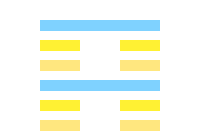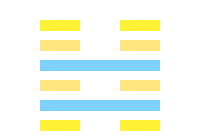52.2.5 (52 > 57)

52.2.5 (52 > 57) - THE KĂN HEXAGRAM.
- 2. The second line, divided, shows its subject keeping the calves of his legs at rest. He cannot help (the subject of the line above) whom he follows, and is dissatisfied in his mind.
- 5. The fifth line, divided, shows its subject keeping his jawbones at rest, so that his words are (all) orderly. Occasion for repentance will disappear.
52.2.5 (52 > 57) - Stop
One knows of few cases where others have been satisfied with a given word.
Bing DeepL Google Yandex52.2.5 (52 > 57) - Stop
One knows of few cases where others have been satisfied with a given word.
Bing DeepL Google Yandex52.2.5 (52 > 57) - Kán, l’arrêt
Kán : ferme, tenir droit, bien réglé, arrêter, reposer
-
2. « Arrêter le mouvement des jambes ». (Ou les tenir droites et bien posées.) Si, devant s’arrêter, on ne peut aider celui qui marche devant soi, on doit en avoir du déplaisir.
On doit aider et se rendre au cri d’appel. -
5. Tenir ses mâchoires de sorte que les paroles sortent de la bouche avec ordre et mesure, cela exempte de repentir.
On sait ainsi conserver le milieu.
52.2.5 (52 > 57) - Cesser
On connaît peu de cas où les autres se sont contentés d'une parole donnée.
Bing DeepL Google Yandex52.2.5 (52 > 57) - Megállás
- 2. Ha a másik többet akar, nem tarthatja vissza.
- 5. Nem fejti ki kételyeit hogy ne okozzon nehézségeket.
The trigrams
The trigrams are combinations of three yin and yang lines. The three bottom lines of the hexagram form the lower trigram and represent the inner situation. The three top lines form the upper trigram and represent the outer situation.
Upper trigram: The mountain The wind


Lower trigram: The mountain The wind


The formation: 52
What is already there

52 - THE KĂN HEXAGRAM.
When one's resting is like that of the back, and he loses all consciousness of self; when he walks in his courtyard, and does not see any (of the persons) in it, there will be no error.
Bing DeepL Google Yandex52 - Stop
One recognizes that it is time to stop because one needs to feed oneself.
Bing DeepL Google Yandex52 - Stop
One recognizes that it is time to stop because one needs to feed oneself.
Bing DeepL Google Yandex52 - Kán, l’arrêt
Kán : ferme, tenir droit, bien réglé, arrêter, reposer
Kan « ferme ». L’homme ferme tourne le dos et s’oppose résolument, sans tenir compte de lui-même. S’il traverse un endroit, il ne regarde pas qui y est et ne faillit point.
Texte
L’homme ferme s’oppose résolument (au mal) sans tenir compte de lui-même. Devant traverser un endroit, il ne regarde pas qui s’y trouve (mais le fait résolument) et ne faillit point.
Symbolisme
Deux montagnes superposées forment le Koua. Ainsi l’homme supérieur pense à ne pas dépasser les bornes de ses fonctions.
Commentaire
Kán signifie s’arrêter, tenir ferme, en bon ordre, agir ou s’arrêter selon l’occasion. Quand l’acte et sa cessation ont lieu en temps convenable, la conduite est belle et intelligente. « Rester à sa place », cela veut dire que les grands et les petits sont en rapport, mais sans usurpation ni entre-croisement. Celui qui est ferme et attentif à son devoir ne se recherche pas lui-même. Marchant dans son jardin, il ne voit pas même qui s’y trouve.
Note. Tout ceci illustre le sens « tenir droit, bien réglé » et se réfère aux rites du maintien extérieur qui prescrivent de se tenir toujours droit et de ne pas même s’asseoir sur un siège qui n’est pas droit.
52 - Cesser
On reconnaît qu'il est temps de s'arrêter car on a besoin de s'alimenter.
Bing DeepL Google Yandex52 - Megállás
Felismeri hogy itt az ideje megállni mert a többieket táplálni kell.
Bing DeepL Google Yandex
52.2 (52 > 18) - THE KĂN HEXAGRAM.
The second line, divided, shows its subject keeping the calves of his legs at rest. He cannot help (the subject of the line above) whom he follows, and is dissatisfied in his mind.
Bing DeepL Google Yandex52.2 (52 > 18) - Being attracted irresistibly
The other wants more, one cannot hold them back.
Bing DeepL Google Yandex52.2 (52 > 18) - Being attracted irresistibly
The other wants more, one cannot hold them back.
Bing DeepL Google Yandex52.2 (52 > 18) - Kán, l’arrêt
Kán : ferme, tenir droit, bien réglé, arrêter, reposer
« Arrêter le mouvement des jambes ». (Ou les tenir droites et bien posées.) Si, devant s’arrêter, on ne peut aider celui qui marche devant soi, on doit en avoir du déplaisir.
On doit aider et se rendre au cri d’appel.
52.2 (52 > 18) - Être attiré irrésistiblement
L'autre en veut plus, on ne peut pas le retenir.
Bing DeepL Google Yandex
52.5 (52 > 53) - THE KĂN HEXAGRAM.
The fifth line, divided, shows its subject keeping his jawbones at rest, so that his words are (all) orderly. Occasion for repentance will disappear.
Bing DeepL Google Yandex52.5 (52 > 53) - Hiding one's concern
One does not express doubts so as not to create difficulties.
Bing DeepL Google Yandex52.5 (52 > 53) - Hiding one's concern
One does not express doubts so as not to create difficulties.
Bing DeepL Google Yandex52.5 (52 > 53) - Kán, l’arrêt
Kán : ferme, tenir droit, bien réglé, arrêter, reposer
Tenir ses mâchoires de sorte que les paroles sortent de la bouche avec ordre et mesure, cela exempte de repentir.
On sait ainsi conserver le milieu.
52.5 (52 > 53) - Dissimuler son inquiétude
On n'exprime pas ses doutes pour ne pas créer de difficultés.
Bing DeepL Google Yandex52.5 (52 > 53) - Megállás
Nem fejti ki kételyeit hogy ne okozzon nehézségeket.
Bing DeepL Google YandexIn the making: 57
What is poised to happen

57 - THE SUN HEXAGRAM.
Sun intimates that (under the conditions which it denotes) there will be some little attainment and progress. There will be advantage in movement onward in whatever direction. It will be advantageous (also) to see the great man.
Bing DeepL Google Yandex57 - Sún, la douceur
Sún : doux, condescendant ; choisir ; tenir fermement.
Sun « douceur ». Avec un faible développement même, par la douceur, la condescendance, on réussira dans ses actes et l’on se montrera vraiment grand. (On doit être) ferme et doux dans ses ordres, même réitérés ; ferme, réfléchi et condescendant dans ses actes, et garder le juste milieu.
Texte
Avec un faible développement même, par la douceur, la condescendance, on pourra réussir dans ses entreprises et se montrer véritablement grand.
Symbolisme
Deux fois le vent forme le Koua sûn. Ainsi le grand et sage sait réitérer ses ordres pour mener à bonne fin ses affaires.
Commentaire
On doit redoubler de bonté quand on réitère ses ordres. Si la fermeté et la bonté restent dans le juste milieu, ce qu’on projette se fera. Le faible doit céder au fort ; ainsi commence le progrès, ainsi l’on réussit et se montre grand.
The nuclear hexagram: 40.1.6 (40 > 38)
The nuclear hexagram is the association of the two inner trigrams (lines 2,3,4 and 3,4,5). It represents the root, or the origin of the situation.

40.1.6 (40 > 38) - THE KIEH HEXAGRAM.
- 1. The first line, divided, shows that its subject will commit no error.
- 6. In the sixth line, divided, we see a feudal prince (with his bow) shooting at a falcon on the top of a high wall, and hitting it. (The effect of his action) will be in every way advantageous.
40.1.6 (40 > 38) - Giving the best of oneself
The weakest don't come because others have given them a better welcome.
Bing DeepL Google Yandex40.1.6 (40 > 38) - Giving the best of oneself
The weakest don't come because others have given them a better welcome.
Bing DeepL Google Yandex40.1.6 (40 > 38) - Kieh, la libération
Kieh : 1. Délivrer, faire échapper, échapper au danger ; 2. Disperser ; 3. Ouvrir, séparer, s’ouvrir. Se dit du mouvement de la germination. 4. Résoudre une difficulté, une complication.
-
1. Délivrer quelqu’un est chose excellente.
Quand le fort et le faible s’entendent selon la justice, il n’y a pas de faute à craindre. - 6. Si le prince est assez habile pour atteindre d’une flèche un faucon posé sur le haut d’un mur élevé, il aura le succès et saura disperser les rebelles.
40.1.6 (40 > 38) - Donner le meilleur de soi-même
Les plus faibles ne viennent pas car les autres leur ont donné un meilleur accueil.
Bing DeepL Google Yandex40.1.6 (40 > 38) - Módosítás
- 1. Fel akarja szabadítani magát, ez egy jó döntés.
- 6. Miután felkészül, meg tudja oldani a problémákat időben.
Ruler
The starting situation

52.5 (52 > 53) - THE KĂN HEXAGRAM.
The fifth line, divided, shows its subject keeping his jawbones at rest, so that his words are (all) orderly. Occasion for repentance will disappear.
Bing DeepL Google Yandex52.5 (52 > 53) - Hiding one's concern
One does not express doubts so as not to create difficulties.
Bing DeepL Google Yandex52.5 (52 > 53) - Hiding one's concern
One does not express doubts so as not to create difficulties.
Bing DeepL Google Yandex52.5 (52 > 53) - Kán, l’arrêt
Kán : ferme, tenir droit, bien réglé, arrêter, reposer
Tenir ses mâchoires de sorte que les paroles sortent de la bouche avec ordre et mesure, cela exempte de repentir.
On sait ainsi conserver le milieu.
52.5 (52 > 53) - Dissimuler son inquiétude
On n'exprime pas ses doutes pour ne pas créer de difficultés.
Bing DeepL Google Yandex52.5 (52 > 53) - Megállás
Nem fejti ki kételyeit hogy ne okozzon nehézségeket.
Bing DeepL Google YandexCorrection
The direction where the ruler is going to bend

52.2 (52 > 18) - THE KĂN HEXAGRAM.
The second line, divided, shows its subject keeping the calves of his legs at rest. He cannot help (the subject of the line above) whom he follows, and is dissatisfied in his mind.
Bing DeepL Google Yandex52.2 (52 > 18) - Being attracted irresistibly
The other wants more, one cannot hold them back.
Bing DeepL Google Yandex52.2 (52 > 18) - Being attracted irresistibly
The other wants more, one cannot hold them back.
Bing DeepL Google Yandex52.2 (52 > 18) - Kán, l’arrêt
Kán : ferme, tenir droit, bien réglé, arrêter, reposer
« Arrêter le mouvement des jambes ». (Ou les tenir droites et bien posées.) Si, devant s’arrêter, on ne peut aider celui qui marche devant soi, on doit en avoir du déplaisir.
On doit aider et se rendre au cri d’appel.
52.2 (52 > 18) - Être attiré irrésistiblement
L'autre en veut plus, on ne peut pas le retenir.
Bing DeepL Google Yandex
